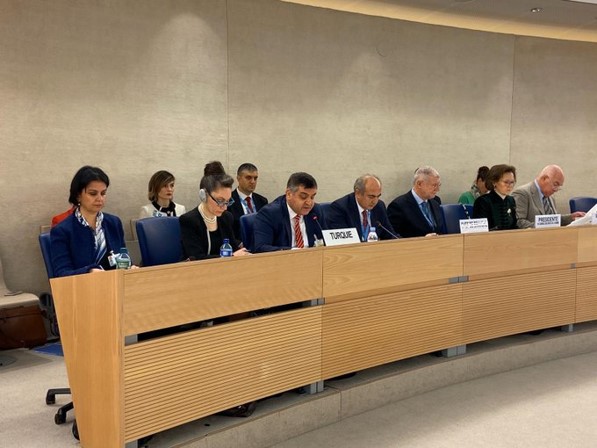Nordic Monitor
In what can be seen as a scandalous move by the government of President Recep Tayyip Erdoğan, a Turkish ambassador who coordinated the abduction of dissidents in Kosovo, has become chief of the human rights department at the Turkish Foreign Ministry.
Former Turkish Ambassador in Pristina Kıvılcım Kılıç was rewarded for her services in Kosovo by President Erdoğan, who appointed her director general for the Council of Europe and Human Rights at the foreign ministry.
Following a controversial coup attempt on July 15, 2016, President Erdoğan’s loyal envoys, including radical Islamist and ultranationalist diplomats, coordinated intelligence operations on foreign soil targeting dissidents.
Ambassador Kılıç led the local elements of an intelligence operation carried out by Turkey’s National Intelligence Organization (MİT) in Kosovo to abduct six Turkish nationals — educators Cihan Özkan, Kahraman Demirez, Hasan Hüseyin Günakan, Mustafa Erdem and Yusuf Karabina — who were working for a group of schools affiliated with the Gülen movement in Kosovo, along with Dr. Osman Karakaya, on March 29, 2018. It was alleged that MİT was instructed to kidnap five Turks but that Özkan was added to the list in Pristina by Ambassador Kılıç.
According to local sources in Kosovo, Turkey’s Pristina embassy was key to the logistics and planning of the abduction and served as a detention center for the abduction operation in Kosovo. The Turkish nationals were kept for a time at the embassy chancery or at the residence of then-Turkish Ambassador Kılıç. The Cumhuriyet daily reported that pictures were taken on the Turkish Embassy premises in Pristina by the state-run Anadolu news agency after their arrest.

Erdoğan had called the failed coup a “gift from God” and moved Turkey away from the core values of the EU by using the coup to restrict democratic rights and erode the rule of law. In the aftermath of the abortive putsch, the Turkish government violated international law by putting over half a million people in detention facilities on dubious terrorism charges; arresting tens of thousands, including journalists, human rights defenders, academics, Kurdish MPs, foreign reporters, civil servants and businessmen; purging at least 152,000 civil servants from their jobs without any effective judicial or administrative investigation; and shutting down media outlets and seizing their assets. Torture allegations have often been voiced by human rights defenders since the failed coup.
According to official reports Turkey has sent 570 extradition requests to 94 countries in the last three-and-a-half years. Over 100 alleged members of the Gülen movement have been abducted abroad by Turkish intelligence and brought back to Turkey as part of the Turkish government’s global manhunt, according to a statement made by Turkish Foreign Minister Mevlüt Çavuşoğlu. They were reportedly subjected to torture and ill-treatment and were denied the right to a fair trial.
In June 2019 the UN Committee Against Torture decided that the extradition of people who were thought to be members, or actually were members, of the Gülen movement, would constitute a breach of Article 3 of the UN Convention against Torture and Other Cruel, Inhuman or Degrading Treatment or Punishment. The decision of the committee reveals that Turkish officials including Ambassador Kılıç, now director general of the foreign ministry’s human rights department, may soon start the preparation of their defense for their role in abduction operations.

President Erdoğan congratulates Ambassador Kılıç for her services in Kosovo
Ambassador Kılıç was involved in an auto accident in Kosovo that left four people dead on November 16, 2018 and was recalled to Turkey due to her severe injuries. Following treatment in Turkey she assumed her new post in the ministry in 2019.
Her department recently drafted Turkey’s presentation for the 35th session of the Universal Periodic Review (UPR), which was delivered by Deputy Foreign Minister Faruk Kaymakcı on January 28, 2020. Turkey’s human rights record was examined by the UPR Working Group for the third time in Geneva.
During the session, Kaymakcı was accompanied by Ambassador Kılıç and Permanent Representative of Turkey to the UN Office in Geneva Sadık Arslan, a former chief advisor to President Erdoğan and former ambassador to the Netherlands. Ambassador Arslan was criticized by the leader of Turkey’s main opposition party, Kemal Kılıçdaroğlu, for his alleged role in a crisis between Turkey and the Netherlands in 2017.

Turkey received 450 recommendations as part of the review, highlighting its dire human rights record in the third UPR. The UPR is a five-year process in which a country’s human rights record and respect for the rule of law are “X-rayed” and subjected to critiques that it is expected to respond to promptly.
At the UPR session, responding to Turkey’s report, a number of states, such as Azerbaijan, Qatar and Venezuela due to their close relations with the government of President Erdoğan in Turkey, were generally supportive. Most others listed major problems in the rule of law, the separation of powers and the exercise of rights and freedoms in Turkey. Representatives urged Turkey to reform Article 7(2) of the Anti-Terrorism Act and Article 220(8) of the Turkish Penal Code to address only incitement to imminent terrorist acts and ensure that any restrictions on expressions of opinion are consistent with Article 19(3) of the International Covenant on Civil and Political Rights (ICCPR).
Moreover, countries asked Turkey to put an end to the arbitrary arrest of media professionals, civil society activists, academics and many others for exercising their rights and fundamental freedoms; to enhance monitoring of detention facilities; to conduct impartial investigations into torture and abuse claims; to end discrimination against members of religious minority groups; to protect freedom of expression, including for journalists and human rights defenders; and to investigate extrajudicial killings.
However, Deputy Minister Kaymakcı responded with full defiance and arrogant hostility and reiterated Turkey’s coup narrative in defense of the deterioration of the country’s human rights record.












